
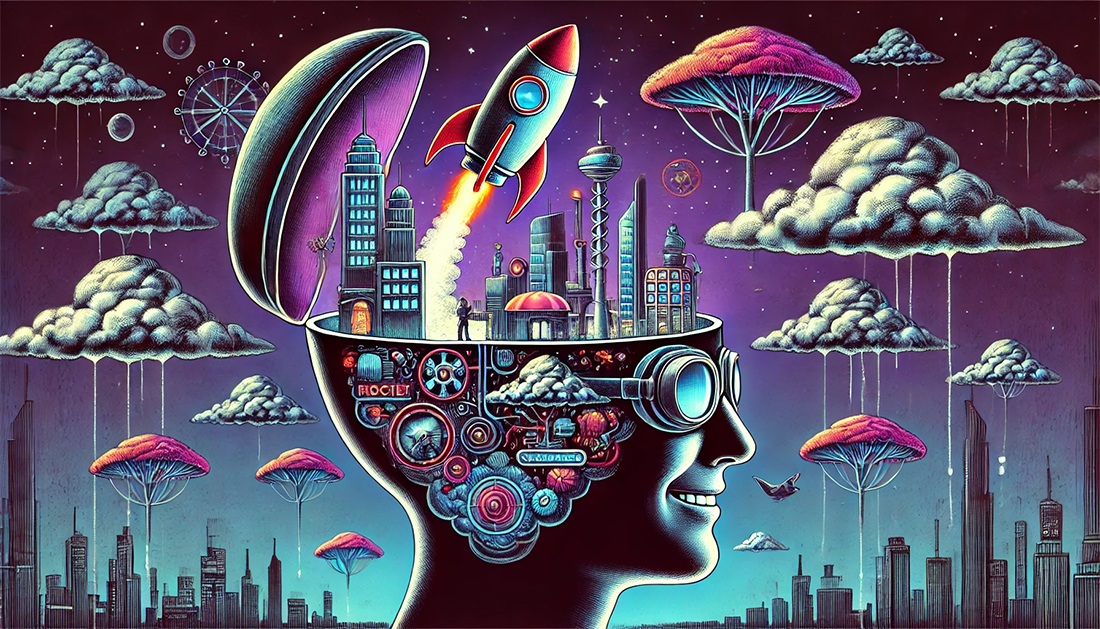
Hello Again,
A week or so ago, I had a “crazy idea”. It wasn’t my first. It was related to a subject I am familiar with but know little about- Dementia. As witness to a few family members forced to navigate its debilitating course, I have seen some of the milder effects of this disease. Some of you may have had similar experiences or perhaps a more intense involvement.
As they often do, my crazy idea came out of the blue, unrelated as far as I know, to any recent events or discussions. What if Dementia in its current form, is only in the early stages of evolution? A work in process if you will. Given time, likely millions of years, dementia (“bad dementia”) could evolve into nearly the opposite of what it is today. That the evolutionary intent of nature is to create a gentle transition toward death, allowing for a more peaceful and accepting end of life experience, what I call, “good dementia”. After all, doesn’t mother nature always have our backs? Making sure life on earth is peaceful, safe and trouble free?
– I am not trying to be flippant or disrespectful about this sensitive issue. I realize this disease extracts a heavy toll on those afflicted with dementia as well as upon the family and friends impacted by its devastating symptoms.-
Reimagining Dementia: My Hypothesis
As people approach the end of life, the brain naturally gravitates toward recalling distant memories, particularly those that are emotionally significant. This includes childhood experiences, significant life events, and interactions with loved ones like grandchildren. A “life review” inclusive of our accomplishments and cherished relationships. This tendency to reflect on the past helps individuals find comfort, meaning, and connection during their final days. Currently, dementia, aka “bad-dementia” interferes with this process in part by messing with our short-term memory leading to stress, anxiety, fear and depression. Short-term memory is the capacity to hold a small amount of information in an active, readily accessible state for a brief period, typically around 15 to 30 seconds.
If dementia (“good dementia”) were to manifest itself with little or no cognitive decline without distress, confusion, anxiety or depression, it could potentially serve as a way to gradually detach from our life’s journey in a joyous and fulfilling way. This new kinder, gentler dementia would allow time for us to emotionally and psychologically prepare for death. All the while enjoying a meaningful and rewarding life review for ourselves as well as our loved ones. We just have not evolved far enough, yet.
I really thought I was onto something big. I was jazzed, pumped. I felt I knew enough about dementia to proceed with my hypothesis regarding its future iteration. I could add facts and statistics related to dementia later. I went all in on the evolution thing as well. Although not an expert by any means, I did take Biology 101 and know a few people who visited the Galapagos. Evolution is good. It seems to work even without and in spite of human intervention. Imagine that.
I researched the past 2 million years of human evolution. I could easily demonstrate, using examples of other advancements in the human brain, body and behavior, that evolution could indeed turn “bad dementia” into “good dementia”. It was only a matter of time. Well, a lot of time actually. Millions of years no doubt.
As I began piecing together some of my findings, matching them to my assumptions, I thought I had better run things by a few family members who shall remain un-named before putting myself out there in a blog. It was my wife and daughter. Both are way smarter than me, not to mention better educated, so I value their opinions. Both of them were a bit skeptical but for different reasons. My daughter with her PhD., expressed doubt about passing on genes that would positively impact future generations with “good dementia”. Primarily because dementia is an “old person disease” and we are past our reproductive years. I mentioned Robert De Niro and Clint Eastwood who among others had children when in their 60’s. She was not impressed. My wife Deborah, as always, couched her honest opinion in kindness. Gentle suggestions, placing responsibility where it belongs, on me. She thought I may want to read up a little more about dementia. The bad kind. The only kind. Compare what I had learned to what I imagined dementia to be, then determine if my hypothesis on a future good dementia was attainable. She is well versed and knowledgeable about dementia. So, I did just that.
I then decided to ignore both of them. Although I will admit initially, I was prepared to scrap the whole idea. I was somewhat confused and getting a headache. Not to let a crazy idea go to waste, I am proceeding and will let you be the judge.
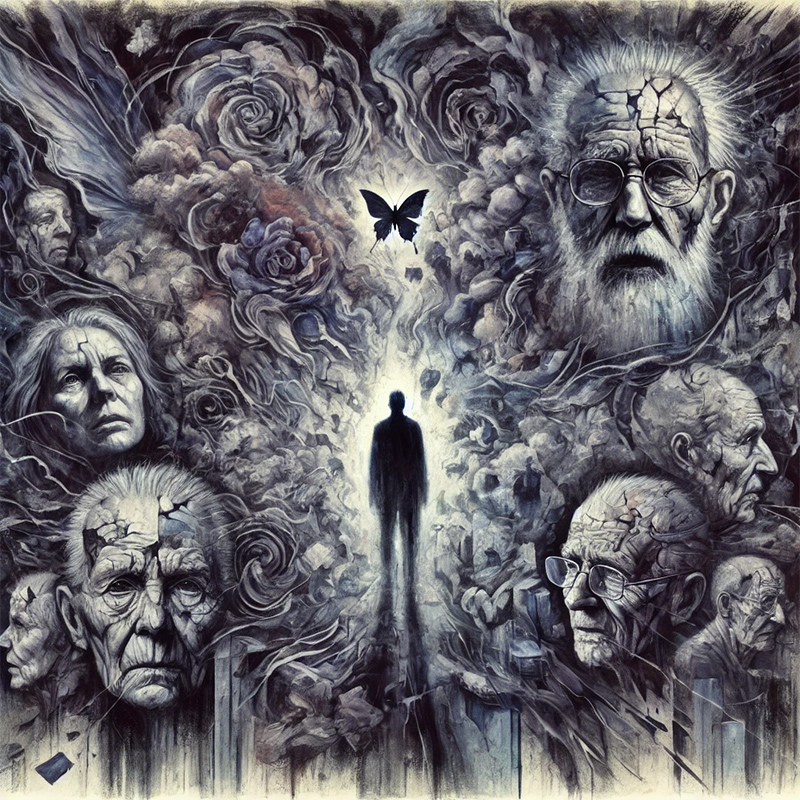
Dementia- The Hard Facts:
Dementia is indeed a disease of “old age”. That the older you are, the more likely you are to develop dementia. Our human ancestors did not live long enough to develop dementia.
It is clear that dementia does not directly affect most people, at any age until one reaches the ripe old age of 100. But what is key here is that dementia is a disease. There is of course “early onset dementia” that occurs before the age of 65. The symptoms are generally similar to regular dementia. Early onset dementia is particularly challenging because it often affects individuals who are still working, raising families, or otherwise engaged in active social and professional lives. Early-onset dementia affects approximately 5-10% of all dementia cases but is rare in the general population effecting less than .05% of individuals.
However, dementia is nasty. Symptoms include:
My God. What was I thinking? How can something this tragic, somehow evolve into something good? Well, perhaps it can. At least in my world, given the right conditions.
Hear me out.
It goes without saying, (so why and I saying it?) that a whole lot of evolution needs to happen. A lot of it. Before humans will be hard wired to accept and possibly enjoy their own death. We have a long way to go. Like millions of years if I am correct before we have “good dementia”.
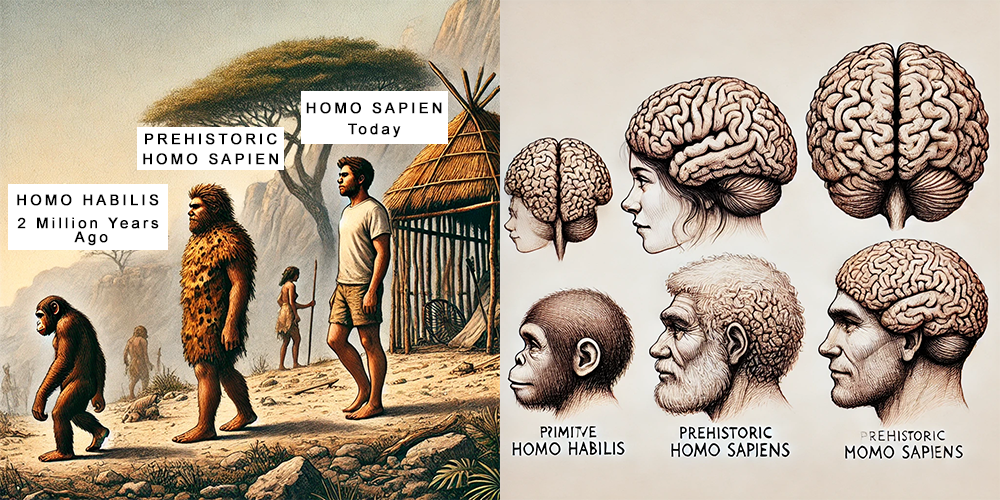
Evolution
Let’s look at Evolution for a few moments in order to better understand my theory. How past evolutionary history sheds light on our development and gives us hope that “good dementia” is on the horizon. Albeit a long way down the line.
Evolution: The Basics
Homo Sapiens, the current iteration of “humans”, have been around for approximately 300,000 years. During that time, although fundamentally similar to our ancestors, we have undergone significant evolutionary changes both subtle and complex.
Physical Evolution-Brain size and structure, Facial and Skeletal Changes, Genetic Adaptations in response to environmental changes, Disease Resistance
Cultural Evolution- Language Development, Tool use and Technology, Social Structures, Art & Culture
Recent Evolution- Genetic Drift & Migration and Epigenetics, suggesting environmental factors can influence gene changes.
I will focus on the brain, because most of the requirements for achieving a “good dementia” would reside in our brains and nervous system.
Human Brain– While Homo sapiens 300,000 years ago had large brains, the structure and complexity of the brain has evolved. Modern humans have more refined neural networks that support advanced cognitive functions like language, abstract thinking, and complex problem-solving. This is also due to us having more refined and efficient neural networks enabling faster and more complex information processing. Our ability to understand and infer the thoughts, intentions, and emotions of others has likely become more refined. This cognitive ability is crucial for social interaction and might have been less developed in early Homo sapiens.
Now consider how far we have come from our oldest human ancestors, Homo Habilis. They roamed the earth from around 2.3 million to 1.65 million years ago. It was they who developed stone tools. Their name actually means “handy man”. There brain was less than half the size of ours with more of a focus on basic motor functions and sensory processing, essential for tool use and survival in a challenging environment. Think finding food and avoiding predators. They had limited capacity for abstract thinking, planning or social interaction but could “gesture” in a pinch or perhaps shout. My point is that we have indeed come far over the past 2 million years of human evolution. Now some dirty laundry.
 Man & Nature
Man & Nature
Many if not most humans see themselves as separate from and superior to nature, rather than an integral part of it. Our hubris and excessive pride have been a driving force behind human progress but also a source of ecological turmoil.
* Many cultures, particularly in the Western tradition, have long held the view that humans have dominion over nature. This perspective is rooted in religious, philosophical, and cultural beliefs that place humans at the center of the universe, with a right or duty to control and exploit natural resources.
* The rise of science and technology further reinforced the idea that humans could master nature. The ability to manipulate natural forces, from harnessing energy to modifying landscapes, contributed to the belief that humanity was separate from and superior to the natural world.
* This hubris has also led to a disconnection from nature. As people have increasingly moved into urban environments and relied on technology, there has been a growing sense of separation from the natural world, leading to a loss of understanding and appreciation for the interconnectedness of all life.
Sounds pretty bad, doesn’t it? However, I must make a case for one exception. That is our deep dive into Medical Science, namely Genetic Research. Specifically, CRISPER. It offers hope to millions suffering a variety of afflictions, including dementia. Without this type of human intervention, we would have to wait many millions of years for nature to prove my hypothesis and produce a good dementia. Humans are already working on ways to reduce or even potentially reverse the negative effects of dementia through various scientific and medical advancements. While there is currently no cure for most types of dementia, several approaches show promise in slowing its progression, mitigating its effects, or preventing it altogether.
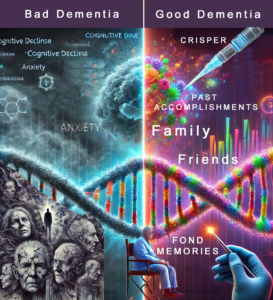 CRISPR offers potential for the targeting of specific genetic mutations that contribute to dementia, particularly early-onset forms linked to known gene mutations (e.g., APP, PSEN1, and PSEN2 for Alzheimer’s). By correcting or modifying these genes, it may be possible to reduce the risk of developing dementia or slow its onset.
CRISPR offers potential for the targeting of specific genetic mutations that contribute to dementia, particularly early-onset forms linked to known gene mutations (e.g., APP, PSEN1, and PSEN2 for Alzheimer’s). By correcting or modifying these genes, it may be possible to reduce the risk of developing dementia or slow its onset.
APOE ε4 Gene Modification: The APOE ε4 gene variant is associated with an increased risk of Alzheimer’s disease. Research is ongoing into how gene editing might be used to mitigate this genetic risk factor.
Stem Cell Therapy: Stem cells offer the potential to repair damaged brain cells or even regenerate neurons that have been lost due to neurodegenerative diseases like dementia. Stem cell therapy could be used to restore brain function or slow the loss of cognitive abilities.
See. Now were talking.
In addition, we have also seen pharmaceutical advances. New drugs and treatments are being developed to target and remove abnormal proteins, with the goal of slowing cognitive decline. Researchers are also exploring neuroprotective drugs: drugs that protect neurons from damage or enhance their ability to repair themselves, potentially mitigating the effects of dementia. Add in a little immunotherapy, a few vaccines and good dementia is just around the corner.
Best Case Scenario:
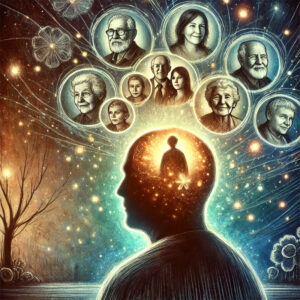 Evolution is unpredictable, driven by forces beyond our control. Scientific advances including CRISPER are inconsistent and never guaranteed to succeed. But for the sake of my hypothesis and my own self esteem I am going to take a giant leap and predict good dementia will exist sometime in the near future. Let’s say 2035. Wow. That’s a bit optimistic. Perhaps I am feeling my own mortality more these days and could benefit from this major breakthrough myself. Besides, it’s my blog.
Evolution is unpredictable, driven by forces beyond our control. Scientific advances including CRISPER are inconsistent and never guaranteed to succeed. But for the sake of my hypothesis and my own self esteem I am going to take a giant leap and predict good dementia will exist sometime in the near future. Let’s say 2035. Wow. That’s a bit optimistic. Perhaps I am feeling my own mortality more these days and could benefit from this major breakthrough myself. Besides, it’s my blog.
Through accelerated evolution, unprecedented developments in science and a touch of magic, we now have good dementia. What does this look like?
Good dementia, in its perfect form, will kick in when our bodies sense that the end is near. Whether that be a few days, weeks or months. Not years, that’s too long. How will our bodies/minds know? It just will. Evolution and CRISPER made it so. The terminally ill and those nearing the end of their natural life, will benefit from a mind devoid of unwanted mental health distractions, free from stress, anxiety and all the other horrors now a big part of bad dementia. Sorry, but I don’t have an answer for those taken by accident or unforeseen tragedies.
 We will enter the final phase of life calm, clear headed and accepting of our death. Our mental faculties will enable us to be present for every day events but devoid of life’s negative juju. Stress, anxiety, depression and fear will be stripped away. We can thoroughly enjoy our final days among family and friends free to enjoy our “life’s review”. Basking in the joy of our past adventures, relationships and accomplishments. Done right, everyone including ourselves would celebrate our passing with the same enthusiasm and joy as our parents and family did at that time of our birth. Ahh, the circle of life.
We will enter the final phase of life calm, clear headed and accepting of our death. Our mental faculties will enable us to be present for every day events but devoid of life’s negative juju. Stress, anxiety, depression and fear will be stripped away. We can thoroughly enjoy our final days among family and friends free to enjoy our “life’s review”. Basking in the joy of our past adventures, relationships and accomplishments. Done right, everyone including ourselves would celebrate our passing with the same enthusiasm and joy as our parents and family did at that time of our birth. Ahh, the circle of life.
As a matter of fact, this condition or state is nothing like dementia, good or otherwise. We need a better name. Perhaps AITNEMED, the reverse spelling of dementia. Meh. Perhaps Harmonic Reflections or Mellow Mind. I’ll work on it.
In many ways what I have just described is the reverse of the first few years of our lives on earth. The focus then was on development. Learning how to survive and moving forward under the watchful gaze of our parents. Oh, before I forget I have a bone to pick, actually two with nature’s evolution. I hope she is listening.
One last thing. A bonus actually for everyone that believes in Heaven, Valhalla, Elysium or the Happy Hunting Grounds. You’re passing as it were is merely from this earth. You have a whole lot more to look forward to afterwords. Others will just have to massage the fact that energy cannot be created nor destroyed. It is the First Law of Thermodynamics after all. Our bodies energy, primarily chemical, converts to other forms of energy like heat or nutrients for plants. Likewise, our body’s matter will enter the ecosystem, supporting new life where ever it goes. Especially, if we select the new trendy way to be buried, composting. Apparently, it’s a thing. Hmm. Isn’t this simply a return to the days of being buried in a shallow grave?
Note to self: No more crazy ideas for a while.
Thanks for listening
Paul Tolejko (TJ)
-END BLOG POST-

I left my home in the small Western New York city of Batavia in March 1977 vowing never to shovel snow again. Never say never. Settling for 38 years in what was for me the "promised land" of Santa Barbara, California. I married, helped raise a family, started a business, traveled and live a wonderful life. We spent the last 10 years of our west coast journey in the small, quiet, picturesque town of Ojai. My oldest friends call me TJ.
My wife Deborah and I moved to Colorado in 2015 to be near our daughter, her husband and 2 growing grand-boys. Add 2 bulldogs (French & English) to the mix and our hands and hearts are full. We all reside in Niwot, a small quaint town 15 minutes north of Boulder. The mighty Rocky Mountains are at our doorstep.
I am a man, son, brother, cousin, friend, husband, father, uncle, grand father, in-law and mostly retired Coloradan. You can read more about me on the About Page. If you are curious about my professional life you can visit my Career at Venture Horizon.
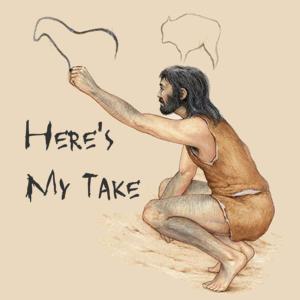
Your information is secure and private. You can cancel at any time.
Thank you both Peters from Santa Barbara.
TJ
Paul,
Thank you for sharing this amazing blog. You have done a lot of great research and I find your ideas as very thought provoking.
I am 86 and my sister who lives in Michigan is 88. She now lives in assisted living and has been experiencing advanced stages of dementia for several years.
About every two weeks, with my nephews assistance we do a FaceTime with my sister Toni. The first few minutes involve a repeated number of things, i.e. the weather, where are you living now etc. We grew up in a small town in Pa. . When I engage her in conversation related to our childhood she has a fantastic memory. If I ask her what she had for dinner, she would have to ask my nephew. Recalling fond memories brings a smile to her face and laughter to both our hearts.
Your article and insight into the possible evolution of evolution into “good dementia” enlightening.
Thank You again for sharing.
Andy
Thank you Andy. I hope I am correct about “good dementia” in the future.
Check out Bob’s recommended book by Chris Palmer titled Achieving a Good Death. Looks
interesting.
https://chrispalmeronline.com/books
Paul
Sorry I disappeared on your last few posts. I enjoy them. This one was great. I too think in terms of the long game and how things are always changing as the universe continues to expand on its way to the ultimate collapse (hopefully many eons away.)
I recently connected with a very interesting filmmaker/author, Chris Palmer. He is our age and has shifted his attention to “Achieving a Good Death” which is the name of his latest book, soon to come out. He is all about changing the story about life ending scenarios, addressing ideas not all that different from good dementia. How this part of our lives can be sweet and peaceful. Check him out. ChrisPalmeronline.com.
Bob
Hi Bob,
Good to hear from you and thanks. I like what Chris Palmer says right off the bat about a good death. I will give him a read.
Paul
Paul, you are way ahead of the “power curve,” as pilots are fond of saying; referring to a skillful operator who anticipates developing conditions, which may require a change in power/speed/trim to maintain control. In an inaugural year, Reason magazine in 1989 noted that the Worldwide Spanish Flu Pandemic of 1918, may have killed so many people, in part due to a “mass hysteria” effect. That is, once our consciousness accepts a causal relationship, the outcome, while not guaranteed, is certainly probabilistically favored. This is the essence of quantum field theory. Obviously, your powers of reasoning do not run with the masses.
I agree with you that dementia could be an evolutionary tactic by our consciousness. I believe that the only reason that your hypothesis is not more apparent is because most people are like lemmings, following the leader over the cliff i.e. opinion leaders and mainstream medical science, who have deemed dementia “bad” (and declared “war”)–and, because the diagnosis itself can confound matters. As with the generic diagnosis of “low back pain,” “dementia” is not a singular entity. Over half of dementias are of the Alzheimer’s variety (AD or Alzheimer’s Disease). That leaves many people with other types of cerebral debility–some treatable, some not. Mis-classification leads to wrong study conclusions.
From a utilitarian and evolutionary perspective, dementia of the AD type is, in a manner of speaking, usually only distressing to the family. The individual with significant AD doesn’t know that they have dementia. Although, as you indicate, adverse accompanying symptoms may include among others, agitation, anxiety, fear, and loss of independence, these may be (to your point) precisely the effects which evolution by epigenetics (and/or gene mutation), can modify or eliminate, resulting in “good dementia.”
As you have noted in prior blogs, Einstein showed that the position of the observer must be considered for an accurate observation of phenomena. With an entire society and world distressed by the likelihood of looming dementia–with resulting mass hysteria, there are few individuals left to observe and speculate that loss of short-term and long-term memory (now known as “volatile” and “non-volatile,” respectively) as a person declines in mental and physical capacities, may in fact, be the kindest expression of a life well-lived.
Thank you for your perspicacity, caring, and humanity. Joe
Hey Paul- It’s been a while! I enjoyed this post, both for the content and the writing style. Keep me on your list! Best, Peter Link
Thank you Peter. I am glad you are enjoying what I have been saying so far.
Stay tuned.
Paul
Wow, very well thought out Paul. It’s sequence moves right along logically as well as emotionally. You write very well. Congratulations!
Thanks a million Peter Hunt.
TJ